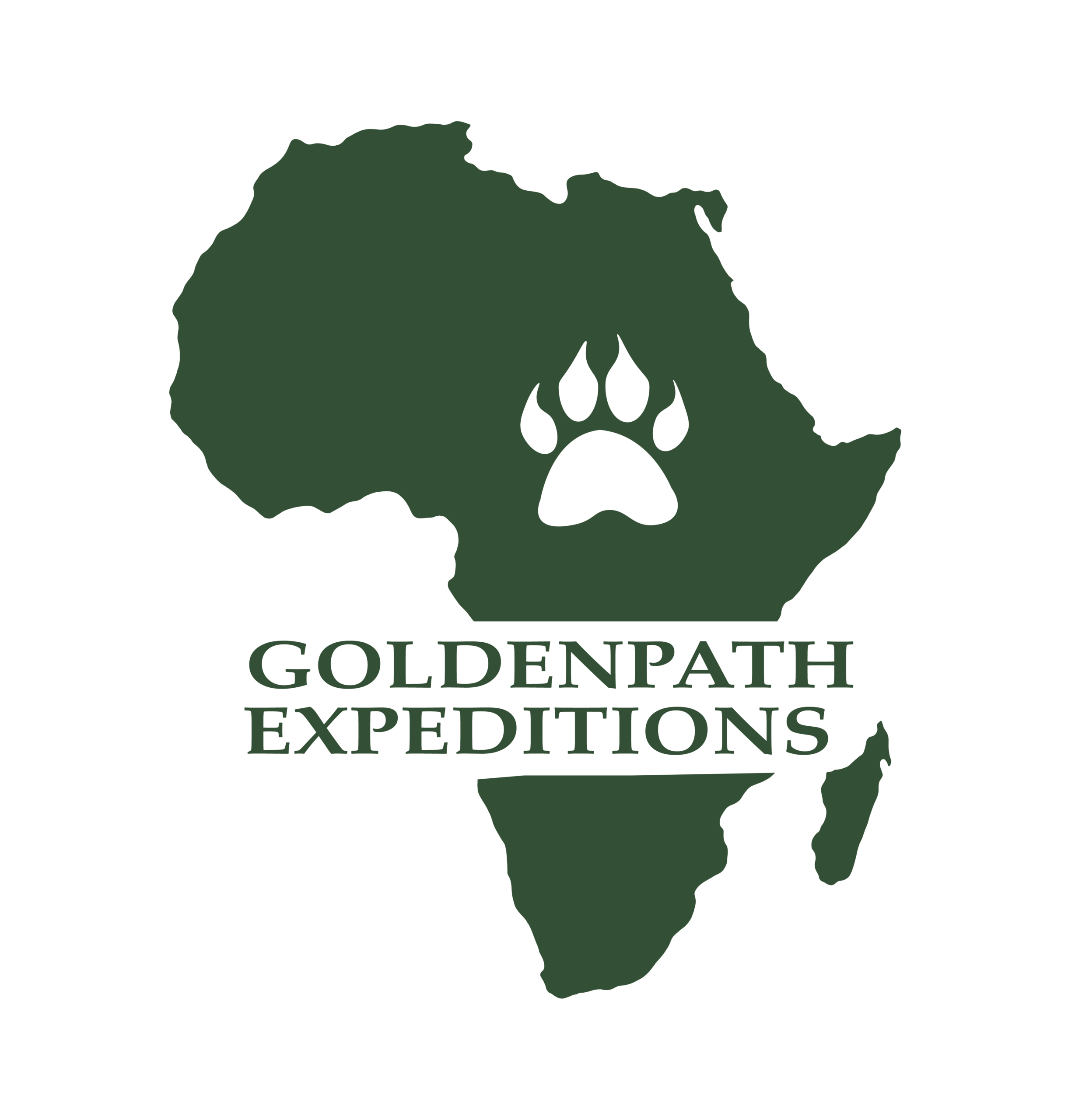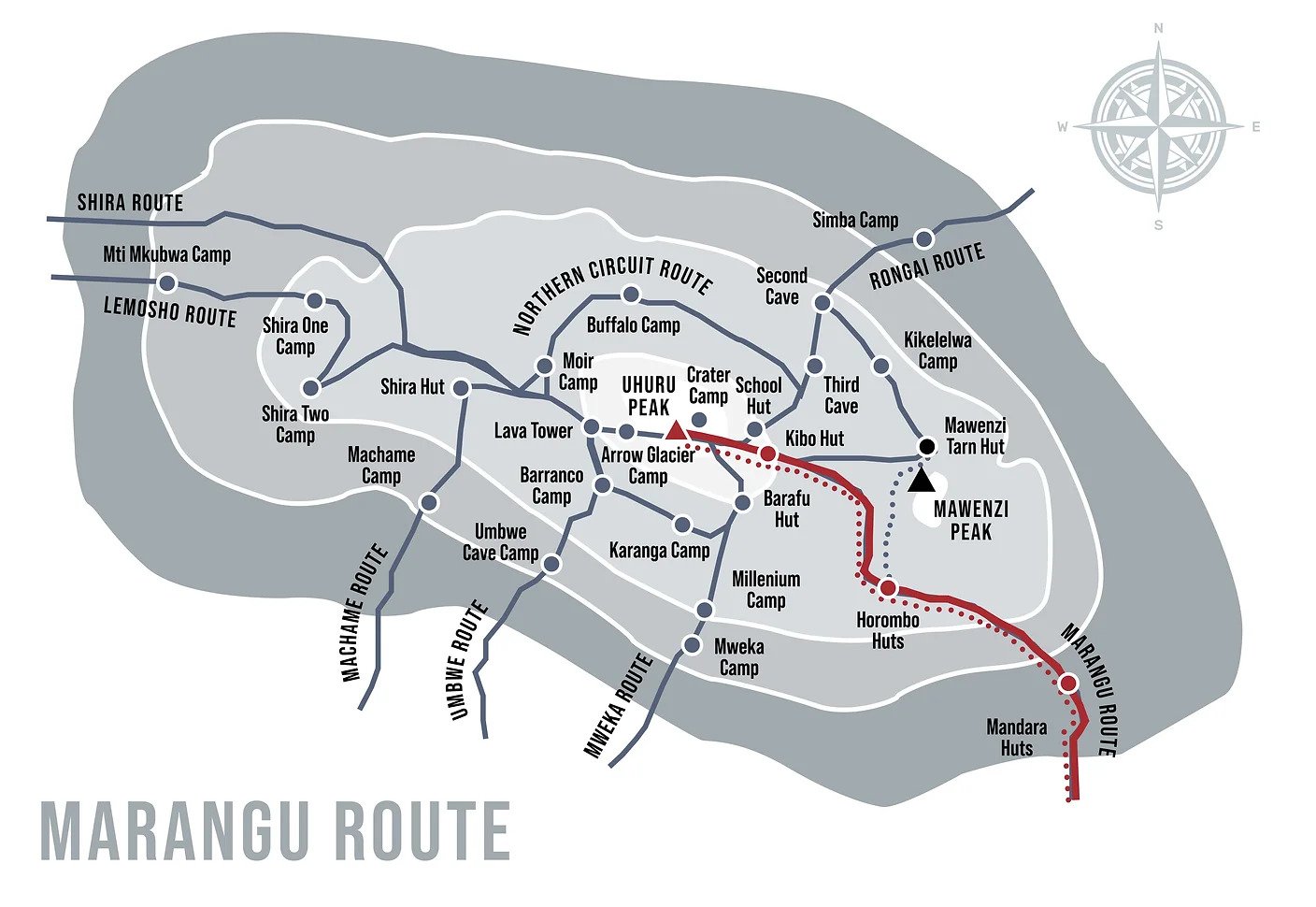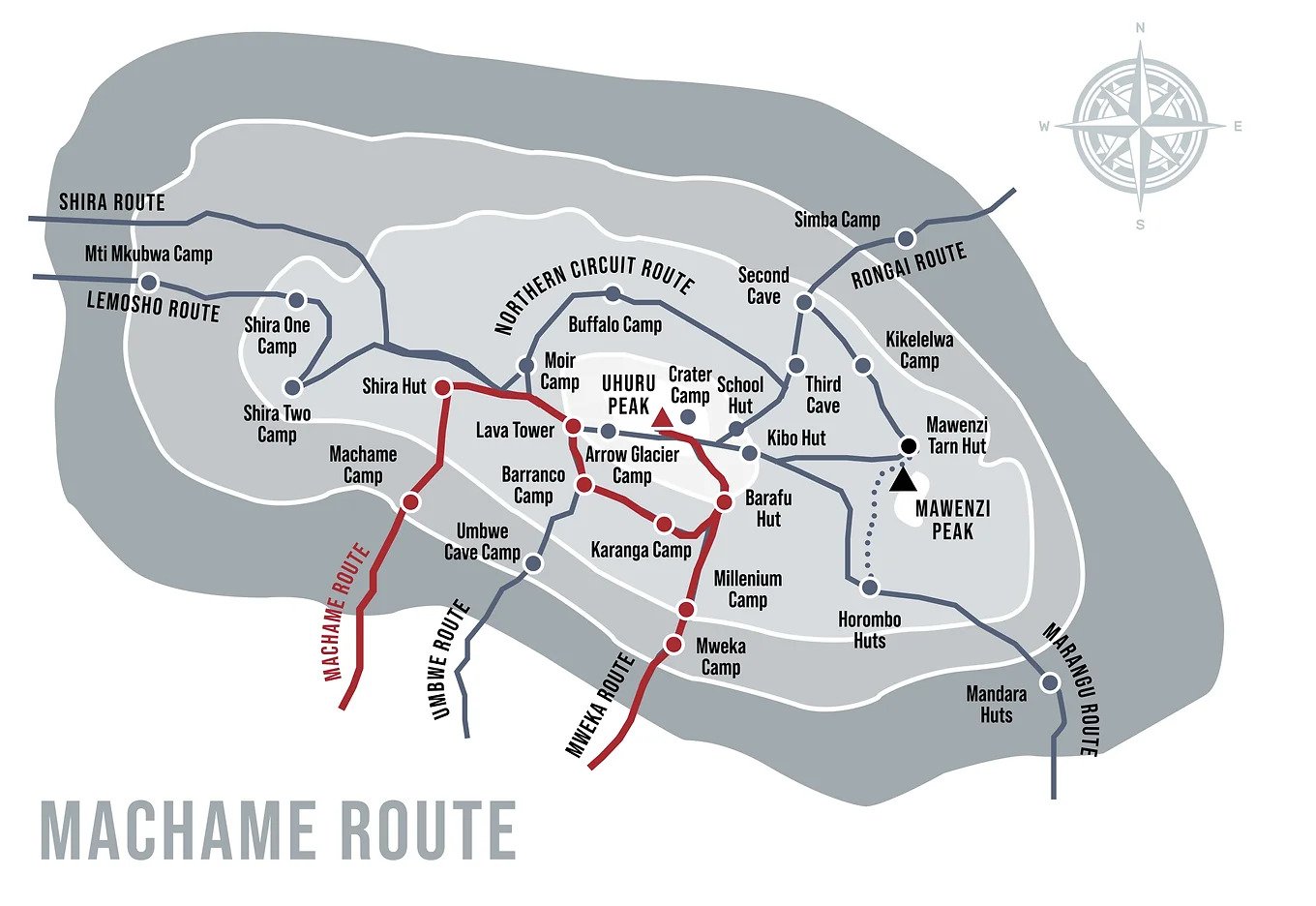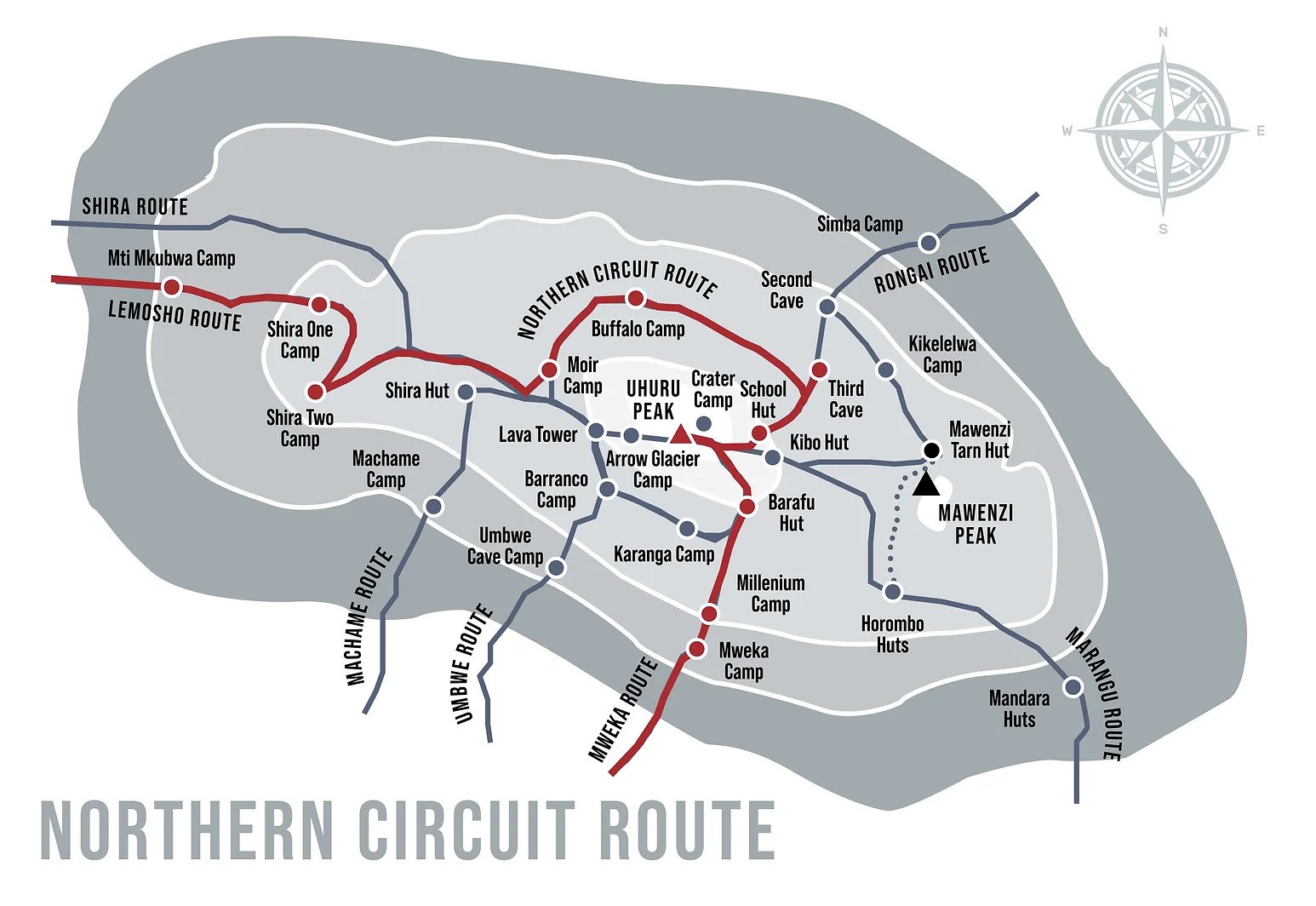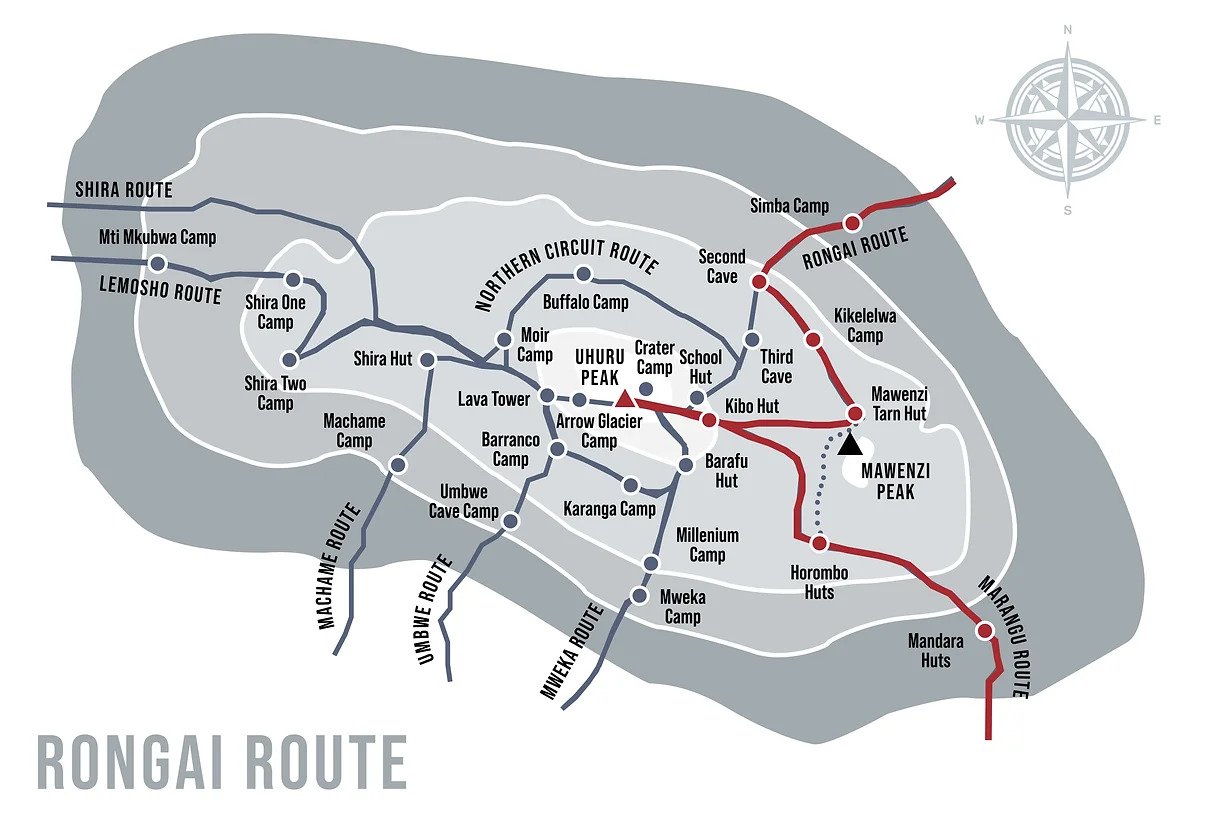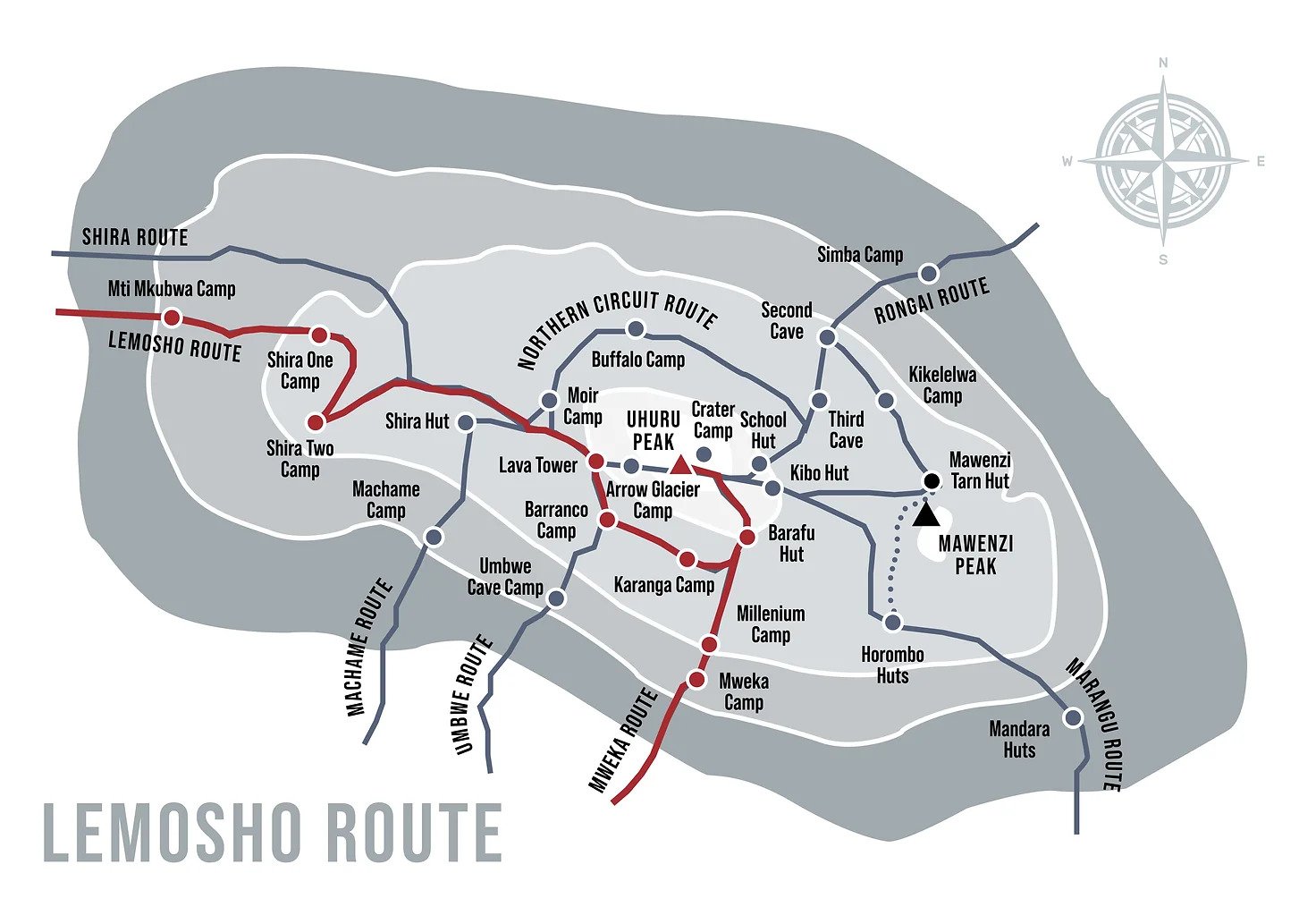Mt Kilimanjaro Treks
Dominating the African horizon like no other summit – Mount Kilimanjaro stands as the highest peak on the continent and the tallest free-standing mountain in the world at 5,895 metres. It is also the highest mountain that can be climbed without technical gear or advanced mountaineering skills.
A trek to the roof of Africa with Golden Path Expeditions is one of the most rewarding and unforgettable journeys any traveler can experience. Time and again, our guests return filled with awe, wonder, exhaustion and delight! Climbers consistently praise our exceptional crew of guides and porters for their energy, support and uplifting spirit, as well as our talented cooks who prepare fresh, hearty meals that keep you strong for each demanding step. We happily accommodate most special menu requests (vegetarian, vegan, gluten free, food allergies, etc.). All of our guides are Wilderness First Responder (WFR) certified and trained in advanced first aid, monitoring your oxygen levels, pulse and blood pressure daily. Emergency oxygen is carried at all times for extra safety. With a summit success rate of 98%, our Golden Path team is unmatched in motivating climbers and inspiring confidence—many guests say they would not have reached the top without their encouragement.
At Golden Path Expeditions, we believe in responsible, ethical travel — especially when it comes to the people who make every climb possible.
We are in the process of aligning with the Kilimanjaro Porters Assistance Project (KPAP) — the local arm of International Mountain Explorers Connection (IMEC) — whose mission is to ensure fair wages, dignified treatment, safe working conditions, and transparent load limits for all mountain crew.
Though we are not yet officially a KPAP partner, we expect to meet all their rigorous standards and formally join soon. When you climb with us, you’re not just reaching summits — you’re supporting a future where every journey respects, protects, and honors the porters and support crew behind it.
A key to our success lies in our policy of employing only handpicked, highly trained, and deeply knowledgeable guides, assistant guides, chefs and porters. We never subcontract; every member of our mountain team is a trusted Golden Path employee dedicated to your safety and success.
We offer both private climbs, which can begin on any day of the year, and open group climbs with set departure dates and routes. There are no minimum or maximum numbers for any expedition. For details about private journeys and group departures, explore the links below and begin planning your own ascent along the Golden Path to the summit of Africa.
Route Choices
There are several incredible routes to reach the summit of Mount Kilimanjaro, each offering its own unique scenery, challenges and duration. Standard itineraries range from 5 to 9 days, allowing climbers to choose the perfect balance between adventure and acclimatization.
The Marangu Route stands apart from the others because overnights are spent in solar-powered, dormitory-style huts instead of tents. It is the shortest and least expensive route, but also the least scenic and offers limited acclimatization due to its rapid ascent. It is the only trail where both the ascent and descent follow the same path.
Among the most popular paths are the Machame and Lemosho Routes. Lemosho, once a little-used trail, is now our most requested climb, thanks to its excellent acclimatization profile and breathtaking scenery. Machame is equally scenic and remains a classic choice for climbers seeking a stunning, varied landscape and a strong chance of summit success.
For experienced mountaineers looking for a true challenge, the Umbwe Route is the steepest and most demanding. However, it offers poor acclimatization and is not recommended for average climbers.
The Rongai Route, approaching from the north, is quieter and often considered the easiest trail on the mountain. It is especially attractive during the wet months (March, April, May, and November) because the north side of Kilimanjaro receives less rainfall.
For those seeking the ultimate combination of scenery, solitude and acclimatization, the Northern Circuit is an outstanding choice. This lesser-used trail offers sweeping vistas and a gradual ascent—though its popularity is quickly growing.
The Mweka Route is used exclusively for descent by Machame, Lemosho, Umbwe and Northern Circuit trekkers, while Rongai and Marangu climbers descend via the Marangu trail (note that huts are available on Marangu but not used for Rongai descents).
Golden Path Expeditions provides a detailed Mount Kilimanjaro Route Map to help you choose the path that best matches your goals, your schedule and your sense of adventure. Whether you seek a scenic trek, the highest success rate, or the toughest challenge, we’ll guide you on the route that leads to Africa’s golden summit.
Kilimanjaro FAQ – Golden Path Expeditions
Q: How difficult is a Mount Kilimanjaro climb?
A: Most of our climbers say the same thing afterward: “It was easier than we thought… until it became much harder than we imagined.” Expect long hiking days and thin air near the summit, but with proper preparation and our expert support, it’s a challenge within reach for determined trekkers.
Q: Is there a best time of year to climb?
A: We operate climbs year-round. However, the long rains (March–May) and short rains (November–December) bring wetter conditions. During those months, the drier north side—such as the Rongai Route or Grand Traverse—is often the best choice.
Q: Can I arrive in Tanzania the same day I start the climb?
A: Only if your flight lands very early (no later than 5 a.m.). An equipment check and guide briefing are required before departure. We recommend arriving the day before for a smoother start.
Q: Where can I store belongings I don’t take on the mountain?
A: Our Moshi office provides secure storage at no charge for any extra luggage.
Q: Can I climb without a tour company?
A: No. Park regulations require climbers to be accompanied by a certified Kilimanjaro guide, and park fees can only be paid through a registered company.
Q: Do I need porters?
A: At least one porter is required. Guides are not allowed to carry equipment, and managing all gear, food, and water without porters is nearly impossible.
Q: If I finish early, can I get a partial refund?
A: Unfortunately not. Park fees are prepaid and our staff is contracted for the full scheduled climb.
Q: Can I add an extra acclimatization day during the trek?
A: On private climbs, yes—if the entire group agrees. Additional costs (about $300 per person per day) are charged after the climb.
Q: What are the toilets like?
A: Public toilets are simple pit latrines. Golden Path provides private chemical toilet tents for every group (max 7 climbers per toilet), cleaned and transported by a dedicated porter. We also supply toilet paper, though bringing an extra roll is wise.
Q: Are the private toilets available along the trail?
A: They’re set up at camps and can be arranged at lunch stops when feasible. During daily hikes, natural cover may be your only option.
Q: Are shower tents available?
A: Yes, for a rental fee (~$150), but we generally advise against it in cold temperatures. We provide warm water and towels for refreshing sponge baths instead.
Q: If someone in my group cannot continue, does everyone turn back?
A: No. We staff assistant guides so one can safely escort any climber who must descend while the rest of the team continues.
Q: Can you accommodate special diets?
A: Absolutely. Our chefs prepare separate meals for vegetarian, vegan, gluten-free, and allergy-sensitive trekkers without affecting the rest of the menu.
Q: How is food kept fresh?
A: Supplies are resupplied mid-trek. Meats are purchased fresh, frozen before departure, and naturally preserved by the cold at higher altitudes.
Q: Do guides speak English?
A: Yes—all lead and assistant guides speak excellent English. With advance notice, we can arrange guides fluent in other languages (Spanish, French, Japanese, etc.).
Q: What time does the climb finish?
A: Machame, Lemosho, Grand Traverse, or Umbwe routes typically return to Moshi by noon or 1 p.m. (earlier if needed). Marangu and Rongai routes usually arrive back around 4 p.m. Early finishers may catch an evening flight or even start a safari the same day (except Marangu/Rongai safari departures).
Q: Is there cell or internet service on the mountain?
A: Spotty at best. Guides carry radios linked to our office for reliable communication. Due to new SIM card regulations, purchasing a local SIM as a visitor is no longer practical.
Q: Can I charge electronics during the climb?
A: There are no charging stations on the mountain. Bring spare batteries or a portable solar charger.
Q: Why do some companies charge much less?
A: Often they are not members of the Kilimanjaro Porters Assistance Project (KPAP) and may underpay or poorly treat staff. Golden Path Expeditions is a proud KPAP partner, ensuring fair wages, proper meals, quality gear, emergency oxygen, and fully licensed operations.
Everything You Need to Know About Mountain Crew Tipping
How many crew members will be on my climb?
While we can confirm the number of guides, assistant guides, and chefs ahead of your trek, the exact number of porters is determined the morning of departure. Each porter carries a maximum of 20kg plus their own gear, and requires 3 meals a day and a mattress—all provided by Golden Path Expeditions (not all companies supply these).
Small groups (1–4 climbers): ~4 porters per climber, plus one extra for private toilet tents.
Larger groups (5+ climbers): ~3 porters per climber.
Marangu route (huts): ~1 fewer porter per climber.
Groups over 10 are considered two climbs by the national park, meaning 2 head guides, 2 cooks, etc., though the team remains together.
Comfort upgrades such as higher-profile tents or mattress/cot enhancements may increase porter numbers.
Recommended Tipping Rates
Based on feedback from past guests, the following guidelines are suggested:
| Role | Daily Tip (USD) | Notes |
|---|---|---|
| Head Guide | $20–$30 | 1 guide per 1–10 climbers, 2 guides for 11–20 |
| Assistant Guide | $15–$20 | 1 AG per 2–4 climbers; scales up with group size |
| Cook | $15–$20 | 1 cook per 10 climbers |
| Porter | $5–$7 | Extra $3/day for tent master, waiter, toilet attendant; $20/trip for summit porters |
Tip calculation: Add guide, assistant/chef, and porter totals, then divide by the number of participants for a suggested per-person amount.
How and When to Tip
Do not bring cash on the mountain. Tips are distributed after your climb at the Golden Path Expeditions office in Moshi.
At the last camp, you will receive a crew list. Decide individually or as a group how much to tip.
Tips can be recorded on paper and handed over at the gate or at the office upon return.
Staff should never request tips directly or indirectly. If any crew member applies pressure or uses tactics to gain sympathy (e.g., exaggerating hardship, dressing poorly), notify our office immediately.
For convenience, envelopes for each staff member are supplied. Golden Path staff can assist with ATM withdrawals if needed.
Credit/debit card payments are not accepted due to Tanzanian VAT regulations.
Alternative Options
If tipping is not your preference, you may allocate extra salary for the crew in advance. Staff will be informed before departure that their pay has been increased.
Donating gear (walking poles, clothing, etc.) is encouraged through our office or KPAP, ensuring distribution is fair and supervised.
Guest Feedback from Tripadvisor
“Tipping is an important part of the hiking economy. The transparency of the system enhanced our confidence in a well-run company.” – August 2023
“There is a tipping ceremony at the end of the hike to ensure everyone receives their fair share. We tipped generously because we felt a strong connection to our crew.” – August 2023
Tipping Charts (USD)
Head Guides ($20–$30/day)
| Days | 1 Head Guide | 2 Head Guides |
|---|---|---|
| 5 | $100–$150 | $200–$300 |
| 6 | $120–$180 | $240–$360 |
| 7 | $140–$210 | $280–$420 |
| 8 | $160–$240 | $320–$480 |
| 9 | $180–$270 | $360–$540 |
Assistant Guides & Chefs ($15–$20/day)
1 chef per 10 climbers; assistant guides scale with group size (2–4, 5–7, etc.).
Tip totals per group range from $75–$1,080 depending on group size and climb duration.
Porters ($5–$7/day)
Estimate 4 porters per climber for small groups, 3 for larger groups.
Additional $3/day for special duties (tent master, waiter, toilet attendant).
Summit day porters: additional $20/trip.
Marangu route requires ~1 fewer porter per climber; private toilet tents require 1 extra porter.
Example: For a 7-day climb with 6 porters, suggested total tips range from $210–$294.
Summary
Tipping is voluntary, but strongly encouraged to support the incredible effort of your guides, porters, and chefs. Golden Path Expeditions ensures a transparent system, so you know your contribution is fair and meaningful.
Golden Path Expeditions – Kilimanjaro Mountain Packing List
Before your climb, we will go through a piece-by-piece equipment check with you. Any item you need can be rented at our shop. As a Golden Path client, you receive a 30% discount on rental items. To ensure availability, please notify us in advance if you plan to rent gear.
Equipment
Sleeping Bag: Comfort rating 0°C (32°F) plus liner.
Trekking Poles: Collapsible, adjustable.
Headlamp: Bring extra batteries.
Duffel Bag: Waterproof, 85L or larger, for porter transport.
Daypack: 30–35L for personal gear during hikes.
Accessories
Sunglasses or Goggles: Polarized, UV-protective.
Backpack Cover: Waterproof.
Water Bottles: 1–3 bottles (Nalgene, 32 oz.) to carry ~3L per day. Avoid storing all water in a Camelbak to prevent freezing or malfunction.
Water Bladder (Camelbak): Optional 3L capacity.
Towel: Lightweight, quick-dry (optional).
Pee Bottle: Recommended to avoid leaving your tent at night (less necessary if using private toilet tents).
Stuff Sacks/Dry Bags: Various sizes to keep gear dry and organized. Note: Disposable plastic bags are no longer allowed; zip-lock bags are acceptable.
Technical Clothing
Waterproof Jacket/Poncho: Breathable, hooded.
Insulated Jacket: Synthetic or down.
Soft Jacket: Fleece or soft-shell.
Long Sleeve Shirts: 2, lightweight, moisture-wicking.
Short Sleeve Shirt: 1, lightweight, moisture-wicking.
Waterproof Pants: Breathable; side zippers ideal.
Hiking Pants: 2 pairs.
Fleece Pants: 1 pair.
Shorts: Optional.
Long Underwear: Moisture-wicking.
Underwear: 5 pairs, moisture-wicking.
Sport Bra (women): 2.
Headwear
Brimmed Hat: Sun/rain protection.
Knit Hat: For warmth.
Balaclava/Scarf/Buff
Handwear
Gloves/Mittens: Warm, waterproof.
Liner Gloves
Footwear
Hiking Boots: Warm, waterproof, broken-in.
Camp Shoes: Optional comfort footwear.
Socks: 5 pairs wool or synthetic.
Liner Socks: Optional, 5 pairs.
Gaiters: Waterproof.
Crampons: Only needed during heavy snow or ice (check with us for April–June treks).
Miscellaneous
Toiletries & Health
Prescription medications (Diamox available locally if needed).
Sunscreen (high SPF).
Lip balm with UV protection.
Insect repellent (DEET, non-pressurized) for lower altitudes.
Personal first aid items (blisters, nausea, headaches).
Hand sanitizer.
Toilet paper (bring an extra roll).
Wet/dry wipes (optional).
Lightweight snacks, high-energy, high-calorie (optional).
Electrolyte powders/tablets (optional).
Camera/phone with extra batteries/memory cards (no charging available unless solar charger is used).
Documents (Do NOT take on the mountain)
Passport
Visa (available at JRO Airport upon arrival)
Immunization papers (Yellow Fever only if from risk area)
Insurance documents
Emergency contacts
Equipment Provided by Golden Path Expeditions
Sleeping tents (clients & staff)*
Mess tent*
Cooking tent*
Sleeping mattress (clients & staff)*
Folding table* & chairs*
Cooking & dining utensils
Cooking fuel
Food & water purification tablets
Emergency oxygen cylinders
Portable stretcher
First aid kit
Walkie-talkie communication with our office (private channel)
*Items marked with an asterisk are not used for Marangu Route.
Meals on the Mountain
Proper nutrition is essential for a successful climb. On Kilimanjaro, your body requires high-energy, easily digestible meals to sustain you. Altitude can reduce appetite and sometimes cause nausea, so food must be appealing, easy on the stomach, and plentiful—sometimes climbers even need to encourage themselves to eat.
Typical breakfast options include:
Porridge, breads/chapati, plantains, pancakes, eggs, sausage, hot chocolate, tea, coffee, and fresh fruit.
Lunch and dinner may include:
Pasta, rice, plantains, potatoes, vegetables, meats, soups or stews, bread, fruit, peanuts, and popcorn.
Our chefs are happy to accommodate special diets—vegetarian, vegan, gluten-free, food allergies, and other dietary restrictions—provided requests are made before departure.
Although food preservation is limited on the mountain, the cold temperatures help maintain freshness, and resupply is provided partway through the trek to ensure quality meals.
With Golden Path Expeditions, you can expect delicious, nourishing, and thoughtfully prepared meals that sustain your body, keep morale high, and make your climb an extraordinary experience.
Mountain Safety
Mt Kilimanjaro is the highest mountain that can be climbed without technical skills or equipment, often referred to as a “walk-up” mountain. This does not make it easy—far from it. At the summit (5,895m / 19,341 ft), there is less than 50% of the oxygen available at sea level. The primary challenge is adjusting to the altitude, as ascending too quickly can overwhelm the body. Unlike technical climbs that progress slowly, Kilimanjaro allows faster ascents, which can increase the risk of altitude-related issues.
It is crucial to climb with experienced guides who monitor your health continuously. Golden Path Expeditions guides are trained Wilderness First Responders (WFR) and measure vital signs including respiration, pulse, oxygen saturation, blood pressure, body temperature, and blood sugar. They assess your condition throughout the trek simply by engaging in conversation, while also watching for subtle signs of altitude sickness. Honesty about your health is essential; all pre-existing conditions and medications must be disclosed before the climb. This does not usually disqualify you but ensures the guides can provide special attention where needed.
Golden Path Expeditions maintains a 98% success rate. Our goal is not just to reach the summit but to ensure 100% safety, guiding climbers carefully while maximizing their chance to summit.
Diamox
Approximately 75% of climbers experience Acute Mountain Sickness (AMS). Symptoms can include headache, nausea, vomiting, diarrhea, loss of appetite, confusion, and irritability. Diamox is a medication that increases respiration and helps the body acclimatize. Its effectiveness varies per individual, and it cannot guarantee protection from AMS. Even elite athletes may need to descend early, while less fit or older climbers can succeed. The current Kilimanjaro age record is 88 years old.
If you choose to use Diamox, it is best purchased in Moshi at pharmacies where it is available in correct dosages and more affordable than abroad. Begin taking Diamox before your trek so guides can monitor for side effects. Specific guidance will be provided by your guide.
First Aid & Emergency Equipment
First Aid Kit: Golden Path provides a fully stocked kit; climbers may bring personal items for blisters, sunburn, insect bites, stomach upset, diarrhea, and headaches.
Stretcher: The National Park’s stretcher system can be rough and potentially dangerous. Golden Path provides portable stretchers if requested, carried by porters to safely evacuate climbers. This may add an extra porter to your climb.
Oxygen: Emergency oxygen is available on all climbs. Guides are trained to administer oxygen correctly and only use it when needed.
Gamow Bag: Optional add-on ($300), a portable compression chamber for severe AMS treatment. While quick descent is generally preferred, a Gamow Bag provides an additional safety option.
Guides & Safety Protocol
The experience and skill of our guides are central to your safety:
Guides perform regular health checks, monitor acclimatization, and track hydration and nutrition.
They provide constant supervision on technical or challenging terrain, including holding hands or arms to ensure safety.
Golden Path guides are highly trained in emergency evacuation and first aid, ensuring every climber is cared for even if unable to continue.
Golden Path Expeditions prioritizes your health and safety above all, ensuring a secure, well-supported, and successful climb of Mt Kilimanjaro.
Training for Your Trek
During your Kilimanjaro trek, you will walk several kilometers each day. The longest day covers 17 km, though 11 km of that is downhill. Walking this distance at high altitude, carrying 3 liters of water and layers of clothing in a daypack, requires a reasonable level of fitness and healthy joints. While moderate fitness is sufficient for many people, the better your physical conditioning, the more enjoyable your climb will be. The current Kilimanjaro records range from 7 years old as the youngest summiteer to 88 years old as the oldest.
The key challenge is not just endurance but acclimatization to altitude. Even world-class athletes have had to descend early due to difficulty adjusting. The most effective preparation is hiking at some elevation before your trek. If high-altitude terrain is not accessible, arriving in Moshi a day or two early can help. Moshi sits at 900 m (2,952 ft), which provides a modest acclimatization benefit for travelers arriving from sea level.
Golden Path Expeditions offers additional opportunities for pre-trek acclimatization and experience:
Half-day cultural tour to a village just outside the National Park, offering light hiking and a taste of local life (see our Coffee & Waterfalls Tour).
Kilimanjaro Day Hike, ideal for those short on time, provides a sample of the mountain experience and a gentle acclimatization hike.
Mt Meru climb (4,565 m / 14,980 ft), a four-day trek nearby, offers excellent preparation and a rewarding climb in its own right. Details will be available on our website soon.
Many climbers also choose to use Diamox to support acclimatization. See our Mountain Safety article for guidance on altitude preparation, medications, and health monitoring.
For best results, walk frequently in the months before your trek, building stamina and conditioning your joints. On the mountain, pace yourself slowly—VERY slowly—to conserve energy and optimize acclimatization. The more prepared your body is, the more you can enjoy the breathtaking scenery and the journey to the “Roof of Africa.”
Travel/Medical Insurance
For Mt Kilimanjaro climbs we require medical insurance coverage. You must be sure that this covers non technical trekking up to 6,000m.
Through experience, we find World Nomads to be a good provider (www.worldnomads.com). You can also consider using Ripcord Rescue Travel Insurance (ripcordrescuetravelinsurance.com). Other companies that our clients commonly use include AIG, Priceline, I-Trek, Columbus Direct, Virgin and Simply Travel Insurance.
Q: Doesn’t Kilimanjaro National Park already charge a rescue fee? Doesn’t this provide coverage?
A: There is a mandatory fee of $20/climber (already included in your climb package price). This goes to maintenance of of rescue equipment such as wheeled rescue stretchers, not towards evacuation costs.
Q: Is there emergency airlift available?
A: Medical helicopter rescue service has been reinstated for Mt Kilimanjaro. This option is used only in the most dire circumstances.
Coffee Tour/Waterfalls Hike
We offer a very popular half day cultural/ acclimatization tour. This tour visits a small village just outside of Kilimanjaro National Park boundary. We will tour a small coffee farm and you will learn from a local guide about the cultivation and processing of coffee. You will also learn about the history and customs of the local Chagga tribe. There will be hiking at a waterfalls and even a chance for a swim if you like. The local women will prepare a lunch consisting of traditional Chagga foods. Included in this tour is private transportation, local fees and taxes, English speaking guide, lunch and drinking water. Good shoes for hiking are needed since to get to the waterfalls involves some steep terrain. Athletic shoes are ok, flip-flops or other shoes withouts much stability are not. There will be a chance for a short swim so a swimsuit underneath your clothes and a towel would be good items to bring. This trip offers some exercise after your long flight but not so much as to tire you out for the climb.
Prices (quoted in USD) 1 person participating: $120, 2 people: $81/person, 3 people: $69/person, 4+ people: $50/person
Mt Kilimanjaro Day Trip (non-summit)
We would pick you up in the morning and drive you to Marangu gate. From there you would walk through the rain-forest to Mandara Hut where you will stop to enjoy lunch. From there you can continue to Maundi Crater to enjoy the view before returning back to the Marangu gate where our vehicle will be waiting to return you back to Moshi. Included is private transportation to and from the mountain, all park entry fees and taxes, box lunch and drinking water and guide salary. Not included is guide tip.
Prices: (quoted in USD)
1 person participating: $220, 2 people: $180/person, 3 people: $172/person, 4 people: $166/person, 5+ people: $150/person
